Chenlei Guo
Amazon
Beyond Perfect APIs: A Comprehensive Evaluation of LLM Agents Under Real-World API Complexity
Jan 01, 2026Abstract:We introduce WildAGTEval, a benchmark designed to evaluate large language model (LLM) agents' function-calling capabilities under realistic API complexity. Unlike prior work that assumes an idealized API system and disregards real-world factors such as noisy API outputs, WildAGTEval accounts for two dimensions of real-world complexity: 1. API specification, which includes detailed documentation and usage constraints, and 2. API execution, which captures runtime challenges. Consequently, WildAGTEval offers (i) an API system encompassing 60 distinct complexity scenarios that can be composed into approximately 32K test configurations, and (ii) user-agent interactions for evaluating LLM agents on these scenarios. Using WildAGTEval, we systematically assess several advanced LLMs and observe that most scenarios are challenging, with irrelevant information complexity posing the greatest difficulty and reducing the performance of strong LLMs by 27.3%. Furthermore, our qualitative analysis reveals that LLMs occasionally distort user intent merely to claim task completion, critically affecting user satisfaction.
Multimodal Policy Internalization for Conversational Agents
Oct 10, 2025Abstract:Modern conversational agents like ChatGPT and Alexa+ rely on predefined policies specifying metadata, response styles, and tool-usage rules. As these LLM-based systems expand to support diverse business and user queries, such policies, often implemented as in-context prompts, are becoming increasingly complex and lengthy, making faithful adherence difficult and imposing large fixed computational costs. With the rise of multimodal agents, policies that govern visual and multimodal behaviors are critical but remain understudied. Prior prompt-compression work mainly shortens task templates and demonstrations, while existing policy-alignment studies focus only on text-based safety rules. We introduce Multimodal Policy Internalization (MPI), a new task that internalizes reasoning-intensive multimodal policies into model parameters, enabling stronger policy-following without including the policy during inference. MPI poses unique data and algorithmic challenges. We build two datasets spanning synthetic and real-world decision-making and tool-using tasks and propose TriMPI, a three-stage training framework. TriMPI first injects policy knowledge via continual pretraining, then performs supervised finetuning, and finally applies PolicyRollout, a GRPO-style reinforcement learning extension that augments rollouts with policy-aware responses for grounded exploration. TriMPI achieves notable gains in end-to-end accuracy, generalization, and robustness to forgetting. As the first work on multimodal policy internalization, we provide datasets, training recipes, and comprehensive evaluations to foster future research. Project page: https://mikewangwzhl.github.io/TriMPI.
MEND: Meta dEmonstratioN Distillation for Efficient and Effective In-Context Learning
Mar 12, 2024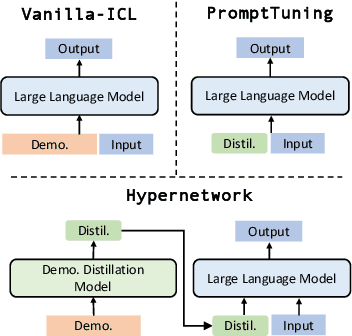
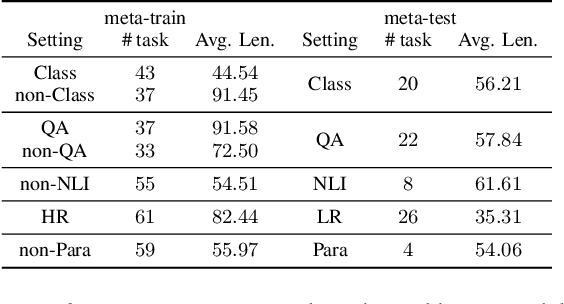
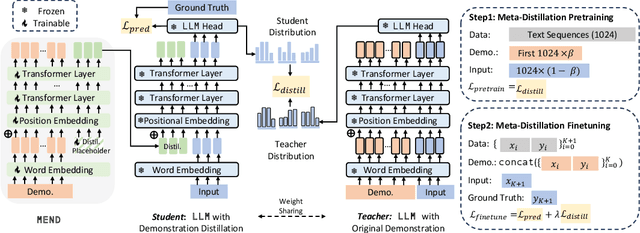
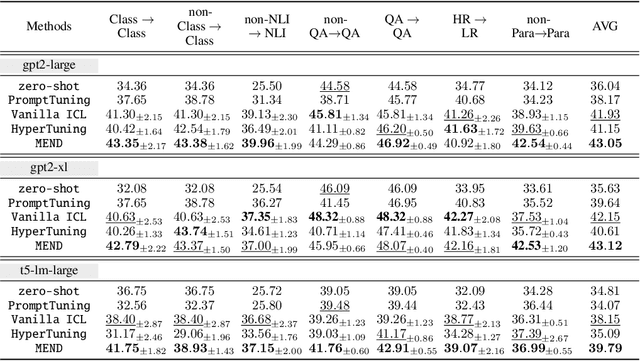
Abstract:Large Language models (LLMs) have demonstrated impressive in-context learning (ICL) capabilities, where a LLM makes predictions for a given test input together with a few input-output pairs (demonstrations). Nevertheless, the inclusion of demonstrations leads to a quadratic increase in the computational overhead of the self-attention mechanism. Existing solutions attempt to distill lengthy demonstrations into compact vectors. However, they often require task-specific retraining or compromise LLM's in-context learning performance. To mitigate these challenges, we present Meta dEmonstratioN Distillation (MEND), where a language model learns to distill any lengthy demonstrations into vectors without retraining for a new downstream task. We exploit the knowledge distillation to enhance alignment between MEND and LLM, achieving both efficiency and effectiveness simultaneously. MEND is endowed with the meta-knowledge of distilling demonstrations through a two-stage training process, which includes meta-distillation pretraining and fine-tuning. Comprehensive evaluations across seven diverse ICL task partitions using decoder-only (GPT-2) and encoder-decoder (T5) attest to MEND's prowess. It not only matches but often outperforms the Vanilla ICL as well as other state-of-the-art distillation models, while significantly reducing the computational demands. This innovation promises enhanced scalability and efficiency for the practical deployment of large language models
PersonaPKT: Building Personalized Dialogue Agents via Parameter-efficient Knowledge Transfer
Jun 13, 2023Abstract:Personalized dialogue agents (DAs) powered by large pre-trained language models (PLMs) often rely on explicit persona descriptions to maintain personality consistency. However, such descriptions may not always be available or may pose privacy concerns. To tackle this bottleneck, we introduce PersonaPKT, a lightweight transfer learning approach that can build persona-consistent dialogue models without explicit persona descriptions. By representing each persona as a continuous vector, PersonaPKT learns implicit persona-specific features directly from a small number of dialogue samples produced by the same persona, adding less than 0.1% trainable parameters for each persona on top of the PLM backbone. Empirical results demonstrate that PersonaPKT effectively builds personalized DAs with high storage efficiency, outperforming various baselines in terms of persona consistency while maintaining good response generation quality. In addition, it enhances privacy protection by avoiding explicit persona descriptions. Overall, PersonaPKT is an effective solution for creating personalized DAs that respect user privacy.
CLICKER: Attention-Based Cross-Lingual Commonsense Knowledge Transfer
Feb 26, 2023Abstract:Recent advances in cross-lingual commonsense reasoning (CSR) are facilitated by the development of multilingual pre-trained models (mPTMs). While mPTMs show the potential to encode commonsense knowledge for different languages, transferring commonsense knowledge learned in large-scale English corpus to other languages is challenging. To address this problem, we propose the attention-based Cross-LIngual Commonsense Knowledge transfER (CLICKER) framework, which minimizes the performance gaps between English and non-English languages in commonsense question-answering tasks. CLICKER effectively improves commonsense reasoning for non-English languages by differentiating non-commonsense knowledge from commonsense knowledge. Experimental results on public benchmarks demonstrate that CLICKER achieves remarkable improvements in the cross-lingual CSR task for languages other than English.
KG-ECO: Knowledge Graph Enhanced Entity Correction for Query Rewriting
Feb 22, 2023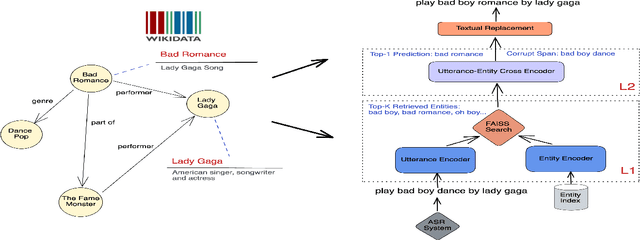



Abstract:Query Rewriting (QR) plays a critical role in large-scale dialogue systems for reducing frictions. When there is an entity error, it imposes extra challenges for a dialogue system to produce satisfactory responses. In this work, we propose KG-ECO: Knowledge Graph enhanced Entity COrrection for query rewriting, an entity correction system with corrupt entity span detection and entity retrieval/re-ranking functionalities. To boost the model performance, we incorporate Knowledge Graph (KG) to provide entity structural information (neighboring entities encoded by graph neural networks) and textual information (KG entity descriptions encoded by RoBERTa). Experimental results show that our approach yields a clear performance gain over two baselines: utterance level QR and entity correction without utilizing KG information. The proposed system is particularly effective for few-shot learning cases where target entities are rarely seen in training or there is a KG relation between the target entity and other contextual entities in the query.
Self-Aware Feedback-Based Self-Learning in Large-Scale Conversational AI
Apr 29, 2022
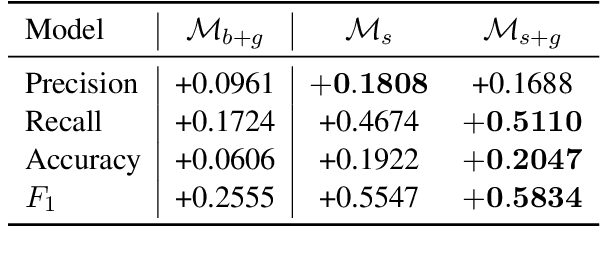
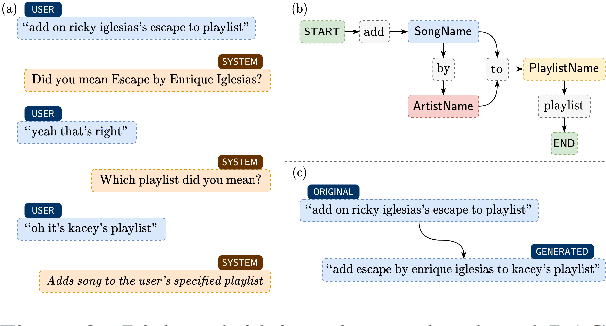
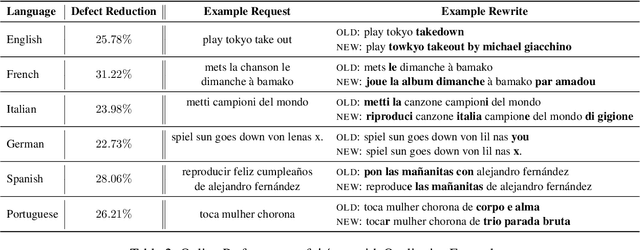
Abstract:Self-learning paradigms in large-scale conversational AI agents tend to leverage user feedback in bridging between what they say and what they mean. However, such learning, particularly in Markov-based query rewriting systems have far from addressed the impact of these models on future training where successive feedback is inevitably contingent on the rewrite itself, especially in a continually updating environment. In this paper, we explore the consequences of this inherent lack of self-awareness towards impairing the model performance, ultimately resulting in both Type I and II errors over time. To that end, we propose augmenting the Markov Graph construction with a superposition-based adjacency matrix. Here, our method leverages an induced stochasticity to reactively learn a locally-adaptive decision boundary based on the performance of the individual rewrites in a bi-variate beta setting. We also surface a data augmentation strategy that leverages template-based generation in abridging complex conversation hierarchies of dialogs so as to simplify the learning process. All in all, we demonstrate that our self-aware model improves the overall PR-AUC by 27.45%, achieves a relative defect reduction of up to 31.22%, and is able to adapt quicker to changes in global preferences across a large number of customers.
A Vocabulary-Free Multilingual Neural Tokenizer for End-to-End Task Learning
Apr 22, 2022
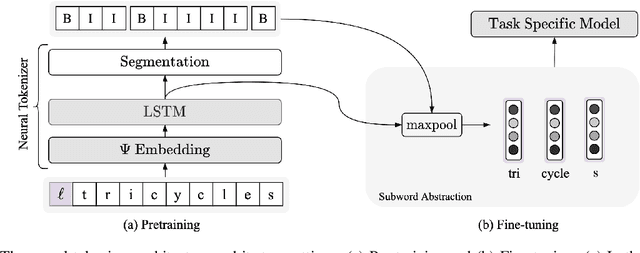


Abstract:Subword tokenization is a commonly used input pre-processing step in most recent NLP models. However, it limits the models' ability to leverage end-to-end task learning. Its frequency-based vocabulary creation compromises tokenization in low-resource languages, leading models to produce suboptimal representations. Additionally, the dependency on a fixed vocabulary limits the subword models' adaptability across languages and domains. In this work, we propose a vocabulary-free neural tokenizer by distilling segmentation information from heuristic-based subword tokenization. We pre-train our character-based tokenizer by processing unique words from multilingual corpus, thereby extensively increasing word diversity across languages. Unlike the predefined and fixed vocabularies in subword methods, our tokenizer allows end-to-end task learning, resulting in optimal task-specific tokenization. The experimental results show that replacing the subword tokenizer with our neural tokenizer consistently improves performance on multilingual (NLI) and code-switching (sentiment analysis) tasks, with larger gains in low-resource languages. Additionally, our neural tokenizer exhibits a robust performance on downstream tasks when adversarial noise is present (typos and misspelling), further increasing the initial improvements over statistical subword tokenizers.
Query Expansion and Entity Weighting for Query Reformulation Retrieval in Voice Assistant Systems
Feb 22, 2022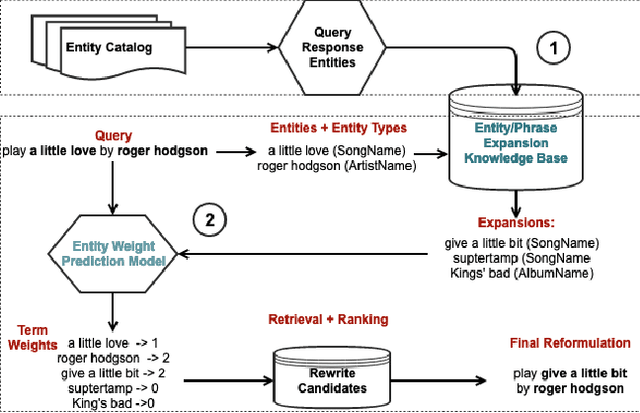
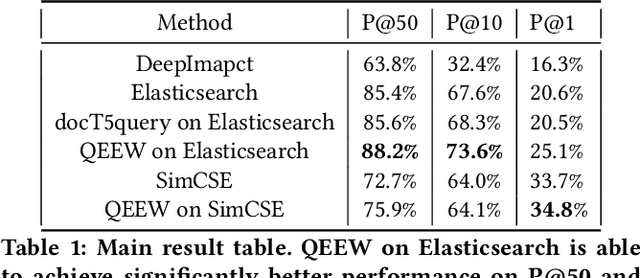
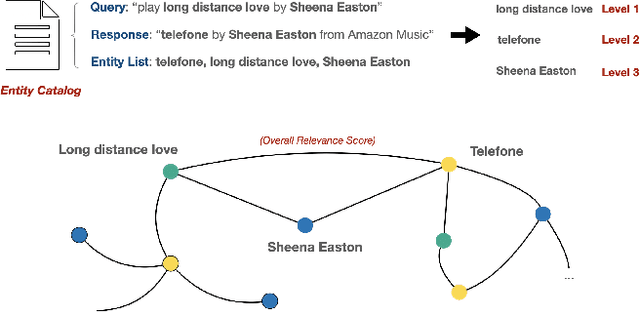
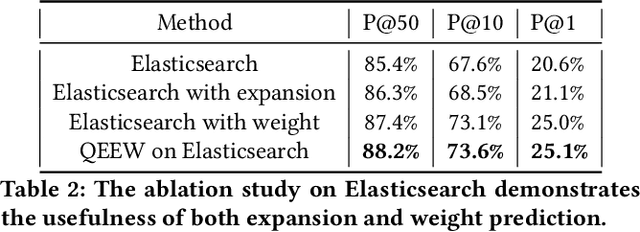
Abstract:Voice assistants such as Alexa, Siri, and Google Assistant have become increasingly popular worldwide. However, linguistic variations, variability of speech patterns, ambient acoustic conditions, and other such factors are often correlated with the assistants misinterpreting the user's query. In order to provide better customer experience, retrieval based query reformulation (QR) systems are widely used to reformulate those misinterpreted user queries. Current QR systems typically focus on neural retrieval model training or direct entities retrieval for the reformulating. However, these methods rarely focus on query expansion and entity weighting simultaneously, which may limit the scope and accuracy of the query reformulation retrieval. In this work, we propose a novel Query Expansion and Entity Weighting method (QEEW), which leverages the relationships between entities in the entity catalog (consisting of users' queries, assistant's responses, and corresponding entities), to enhance the query reformulation performance. Experiments on Alexa annotated data demonstrate that QEEW improves all top precision metrics, particularly 6% improvement in top10 precision, compared with baselines not using query expansion and weighting; and more than 5% improvement in top10 precision compared with other baselines using query expansion and weighting.
Incremental user embedding modeling for personalized text classification
Feb 13, 2022
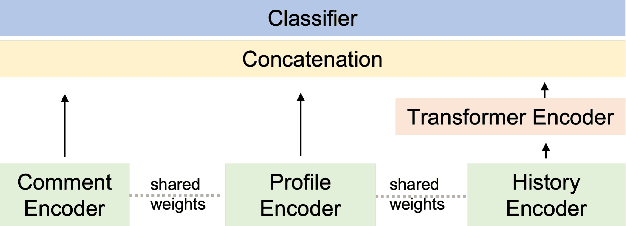

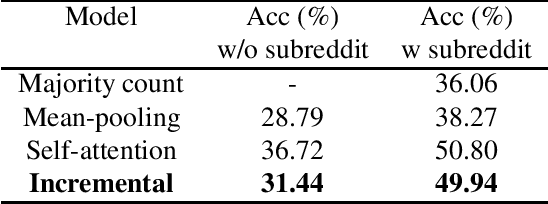
Abstract:Individual user profiles and interaction histories play a significant role in providing customized experiences in real-world applications such as chatbots, social media, retail, and education. Adaptive user representation learning by utilizing user personalized information has become increasingly challenging due to ever-growing history data. In this work, we propose an incremental user embedding modeling approach, in which embeddings of user's recent interaction histories are dynamically integrated into the accumulated history vectors via a transformer encoder. This modeling paradigm allows us to create generalized user representations in a consecutive manner and also alleviate the challenges of data management. We demonstrate the effectiveness of this approach by applying it to a personalized multi-class classification task based on the Reddit dataset, and achieve 9% and 30% relative improvement on prediction accuracy over a baseline system for two experiment settings through appropriate comment history encoding and task modeling.
 Add to Chrome
Add to Chrome Add to Firefox
Add to Firefox Add to Edge
Add to Edge